Qualitative Research in Psychology
Course Number: PS398
Subject: Psychology
Library Accessibility Service Notice
- Titles in Omni search results may be difficult to understand with some JAWS versions
- The maker of PsycINFO, ProQuest, is fixing a bug that affects screen reader users. In PsycINFO's search results list, the phrase "Scholarly Journal" appears before the article title heading 3, which can make it difficult to find.
Search Omni for Journal Articles and Books
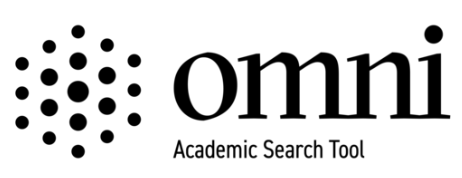
Omni is a general academic search engine subscribed to by the Laurier Library.
As it is general, it will find journal articles, books, and more from all sorts of academic disciplines.
- Go to Omni
Search PsycINFO for Journal Articles
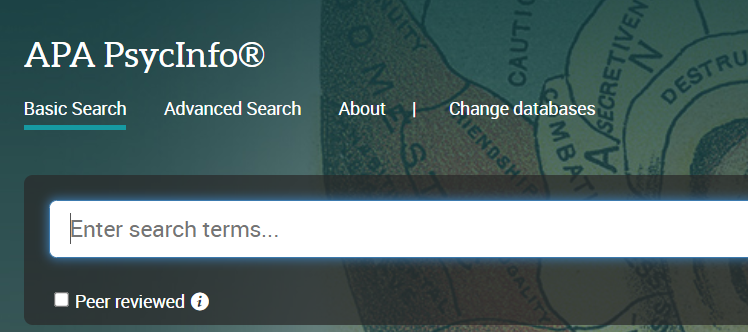
APA PsycINFO (note: APA stands for American Psychological Association) is a specialized academic search engine. The Laurier Library subscribes to it through the ProQuest company. It has special features designed for psychology students, faculty, and researchers. It searches for mostly psychology journal articles.
- Go to APA PsycINFO
Finding the Parts of a Reference in Omni
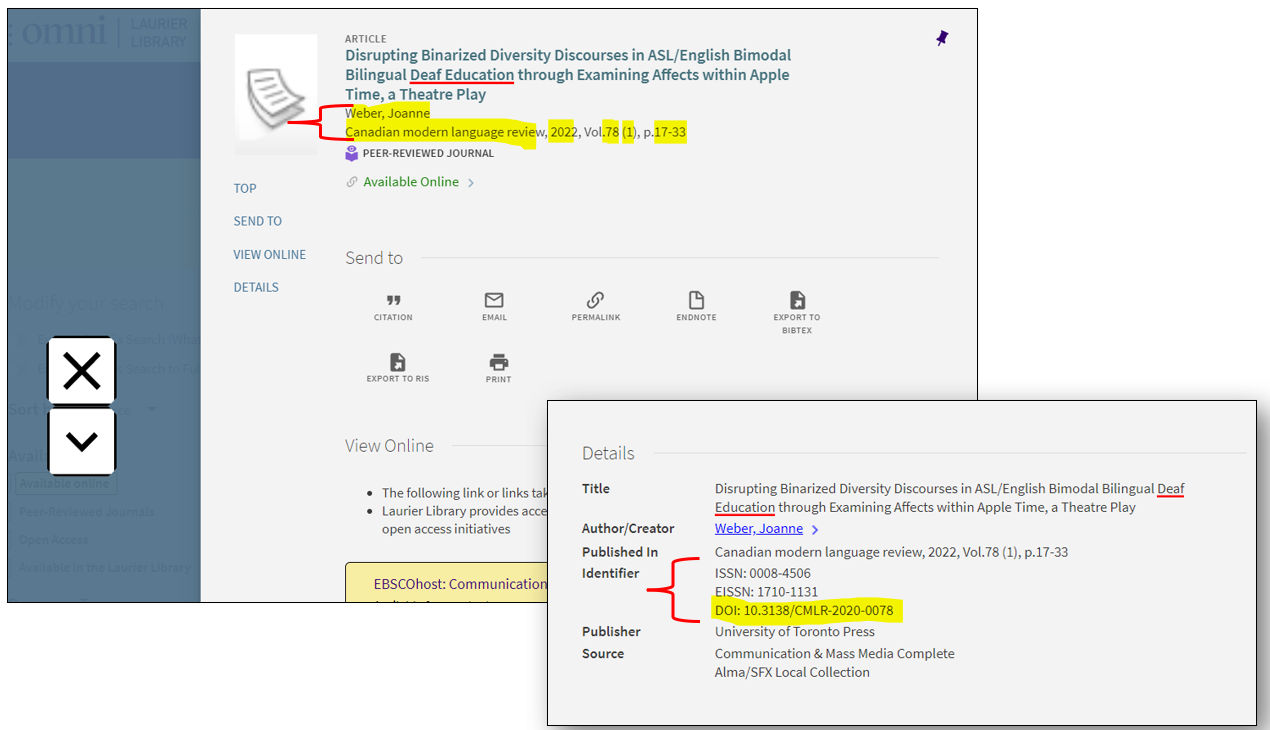
Image description
This description is provided for blind and DeafBlind individuals who use screen readers or braille displays (with captions). It represents the information that is displayed in Omni and presented here for learning.
ARTICLE
heading 3 Disrupting Binarized Diversity Discourses in ASL/English Bimodal Bilingual Deaf Education through Examining Affects within Apple Time, a Theatre Play. That is the article title
Weber, Joanne. That is the author.
Canadian modern language review, 2022, Vol.78 (1), p.17-33. That is the journal title, 2022 is the year of publication, 78 is the volume, 1 is the issue, and 17-33 are the page numbers.
What follows is the path to get the digital object identifier. Down.
PEER-REVIEWED JOURNAL
Move to the "Send to" heading 4
Send to, heading level 4
View Online, heading level 4. This section contains the various library collections that have the article. To get an accessible copy email libaccessibility@wlu.ca
Move to the "Details" heading 4
Details, heading level 4. Step through this section to find other information about this article.
Title
list, Disrupting Binarized Diversity Discourses in ASL/English Bimodal Bilingual Deaf Education through Examining Affects within Apple Time, a Theatre Play
Author/Creator
list, link Weber, Joanne
Published In
list, Canadian modern language review, 2022, Vol.78 (1), p.17-33
Identifier
list of 3 items
ISSN: 0008-4506
EISSN: 1710-1131
DOI: 10.3138/CMLR-2020-0078
Getting Author, Date, Title, and Source from Omni
Examine the item Omni (this goes to the search results. You'll have to click the relevant item in the search results to get the full record)
Author | Date Published | Title of Article | Source for Periodicals - Journal title | Source for Periodicals - Volume & Issue | Source for Periodicals - Page numbers | Source for Periodicals - DOI, (Digital Object Identifier) |
|---|---|---|---|---|---|---|
Joanne Weber | 2022 | Disrupting Binarized Diversity Discourses in ASL/English Bimodal Bilingual Deaf Education through Examining Affects within Apple Time, a Theatre Play | Canadian modern language review | Volume 78 Issue 3 | 17-33 | DOI: 10.3138/cmlr-2020-0078 |
Finding the Parts of a Reference in APA PsycINFO
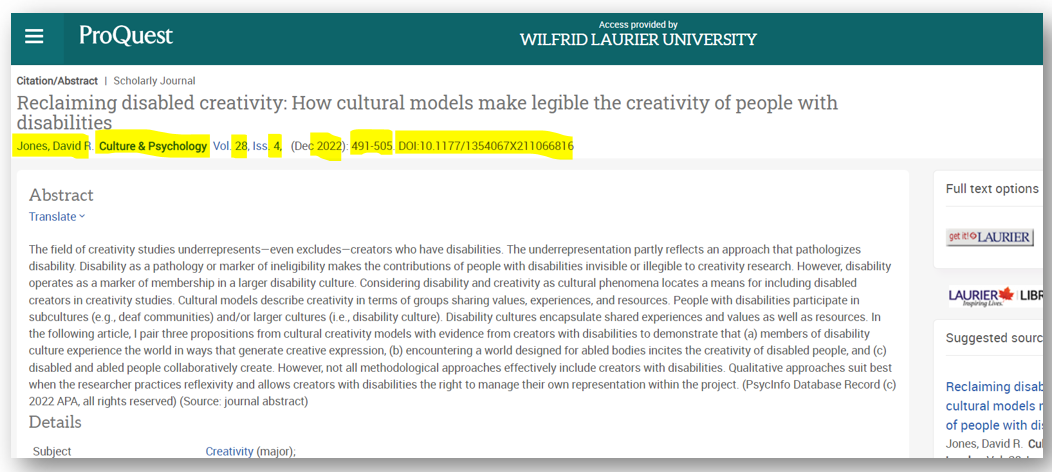
Image description
This description has features for blind and DeafBlind individuals who use screen readers or braille displays (with captions).
Scholarly Journal
list end
heading 1, Reclaiming disabled creativity: How cultural models make legible the creativity of people with disabilities
link, Jones, David R.
link, Culture & Psychology
link, Vol. 28, Iss. 4, Librarian note: 28 is the volume and 4 is the issue
(Dec 2022): 491-505. DOI:10.1177/1354067X211066816 Librarian note: 2022 is the year, 491-505 are the page numbers, and the Document Object Identifier starts at 10 and ends with 816.
Be sure to explore the rest of the page as there's lots of important information for evaluating the relevance of the article.
Getting Author, Date, Title, Source from PsycINFO
Examine the item in APA PsycINFO
Author | Date Published | Title of Article | Source for Periodicals - Journal title | Source for Periodicals - Volume & Issue | Source for Periodicals - Page numbers | Source for Periodicals - DOI (Document Object Identifier) |
|---|---|---|---|---|---|---|
David R. Jones | 2022 | Reclaiming disabled creativity: How cultural models make legible the creativity of people with disabilities | Culture & Psychology | Volume 28 Issue 4 | 491-505 | DOI:10.1177/1354067X211066816 |
Building References: Journal Article with One Author
![]()
Breakdown of Formatting Rules
Formatting Stage | Author | Date Published | Title | Source - Journal | Source - Volume & Issue | Source - Page | Source - DOI |
|---|---|---|---|---|---|---|---|
Input | Debra Penney | October 4, 2022 | Iraqi Muslim Women and Primary Healthcare Providers’ Perspectives and Experiences in the Clinic Visit in the Western United States | Qualitative Health Research | Volume 32, issue 3 | pages 2040 - 2052 | 10.1177/10497323221130843 |
Rules | Last name Comma First name initial Period Space | Left parenthesis Year Right parenthesis Period Space | Title of article Period Space | Journal title in italics Comma Space |
Volume in italics Left parenthesis Issue Right parenthesis Comma Space | Start page Dash End page Period | https colon forward slash forward slash doi.og forward slash DOI number |
Output | Penney, D. | (2022). | Iraqi Muslim Women and Primary Healthcare Providers’ Perspectives and Experiences in the Clinic Visit in the Western United States. | Qualitative Health Research, | 22(3), | 2040-2052. | https://doi.org/10.1177/10497323221130843 |
Final Reference
Penney, D. (2022). Iraqi Muslim Women and Primary Healthcare Providers’ Perspectives and Experiences in the Clinic Visit in the Western United States. Qualitative Health Research, 22(3), 2040-2052. https://doi.org/10.1177/10497323221130843
Building References: Journal Article with Multiple Authors
![]()
Breakdown of Formatting Rules
Formatting Stage | Author | Date Published | Title | Source - Journal | Source - Volume & Issue | Source - Page | Source - DOI |
|---|---|---|---|---|---|---|---|
Input | Lucinda McKnight Ben Whitburn | February 6, 2017 | The fetish of the lens: persistent sexist and ableist metaphor in education research | International Journal of Qualitative Studies in Education | Volume 30, issue 9 | 821 to 831 | 10.1080/09518398.2017.1286407 |
Rules | Last name Comma First name initial Period Space Middle name initial, if one is present Period Comma Space Repeat that for all but last author Before the final author's last name put the ampersand symbol: &. Press shift + 7 on your keyboard for it. Space | Left parenthesis Year Right parenthesis Period Space | Title of article Period Space | Journal title in italics Comma Space |
Volume in italics Left parenthesis Issue Right parenthesis Comma Space | Start page Dash End page Period | https colon forward slash forward slash doi.og forward slash DOI number |
Output | McKnight, L. & Whitburn, B. | (2017). | The fetish of the lens: persistent sexist and ableist metaphor in education research | International Journal of Qualitative Studies in Education, | 30(9), | 821-831. | https://doi.org/10.1080/09518398.2017.1286407 |
Final Reference
McKnight, L. & Whitburn, B. (2017). The fetish of the lens: persistent sexist and ableist metaphor in education research. International Journal of Qualitative Studies in Education, 30(9), 821-831. https://doi.org/10.1080/09518398.2017.1286407
Building References: Book with One Author
![]()
Breakdown of Formatting Rules
Formatting Stage | Author | Date Published | Title of Book | Source - Publisher |
|---|---|---|---|---|
Rules | Last name Comma First name initial Period Space | Left parenthesis Year Right parenthesis Period Space | Title of Book in italics Period Space | Publisher name Period. |
Example | Freebody, P. | (2003). | Qualitative research in education interaction and practice | SAGE. |
Final Reference
Freebody, P. (2003). Qualitative research in education interaction and practice. SAGE.
Building References: Book with Multiple Authors
![]()
Breakdown of Formatting Rules
Formatting Stage | Author | Date Published | Title of Book | Source - Publisher |
|---|---|---|---|---|
Rules | Last name Comma First name initial Period Space Middle name initial, if one is present Period Comma Space Repeat that for all but last author Before the final author's last name put the ampersand symbol: &. Press shift + 7 on your keyboard for it. Space | Left parenthesis Year Right parenthesis Period Space | Title of Book in italics Period Space | Publisher name Period. |
Output | Sherman, R. R., & Webb, R. B. | (2004). | Qualitative Research in Education | Taylor and Francis. |
Final Reference
Sherman, R. R., & Webb, R. B. (2004). Qualitative Research in Education. Taylor and Francis.
Building References: Twitter
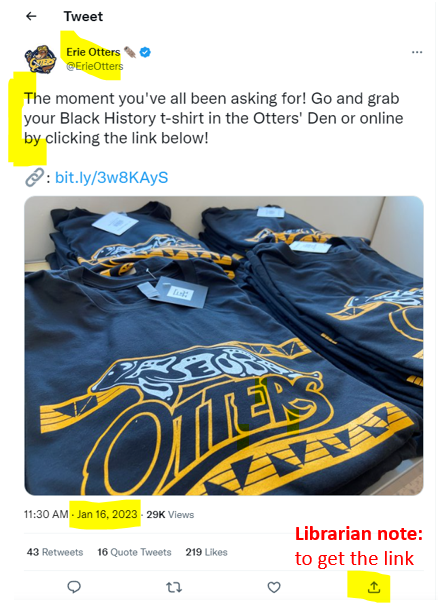
image description
This description has features for blind and DeafBlind individuals who use screen readers or braille displays (with captions).
The tweet described below can be found on Twitter.
Conversation, heading 1,
Erie Otters 🦦 Verified account @ErieOtters The moment you've all been asking for! Go and grab your Black History t-shirt in the Otters' Den or online. by clicking the link below! 🔗 : bit.ly/3w8KAyS Image Reply Retweet Like Share Tweet article. Librarian's note: That's contains duplicate of the message content of the tweet, which is also below.
link, Erie Otters 🦦. Librarian's note: That's part of the author. Caution: The second "Otter" is an emoticon. The APA manual of style does not tell us what to do with emoticons. It should probably be removed from the reference. I have reported this to the American Psychological Association and indicated identifying emoticons is a problem for blind scholars.
link, Verified account
link, @ErieOtters. Librarian's note: That's part of the author.
More, button menu, contracted
The moment you've all been asking for! Go and grab your Black History t-shirt in the Otters' Den or online by clicking the link below! Librarian's note: That's the content of the tweet
🔗, graphic
:
link, bit.ly/3w8KAyS
link, Graphic, Image Librarian's note: This is the image that needs a brief description.
link, 11:30 AM · Jan 16, 2023 Librarian's note: That's the date.
29K
Views, link, 43
Retweets, link, 16
Quote Tweets, link, 219
Likes
button, Reply
button menu, collapsed, Retweet
button, Like
button menu, collapsed, Share Tweet. Librarian's note: Open this button menu and select the Copy link to Tweet to copy the Tweet's link to the clipboard.
Breakdown of Formatting Rules
Formatting Stage | Author | Date Published | Title of Book | Source - Social Mediate site Name | Source - Link |
|---|---|---|---|---|---|
Rules for Tweet for Group | Name of Group Left bracket Ampersand symbol, @ Twitter username Right bracket Period Space | Left parenthesis Year Comma Space Month Space Date Right parenthesis Period Space | Content of the post up to the first 20 words Space Left bracket Description of any audiovisuals Right bracket Period Space | Site name Period. | Link to tweet |
Example | Erie Otters [@ErieOtters] | (2023, January 16). | The moment you've been asking for! Go and grab your Black History t-shirt in the Otters' Den or online by [Image of stacks of folded Erie Otter t-shirts]. | Twitter. | https://twitter.com/ErieOtters/status/1615023632249389056 |
Final Reference
Erie Otters [@ErieOtters] (2023, January 16). The moment you've been asking for! Go and grab your Black History t-shirt in the Otters' Den or online by [Image of stacks of folded Erie Otter t-shirts]. Twitter.
In-Text Citations
![]()
Citations appear in the text of your essay. APA uses the author-date citation pattern.
Example citations
We'll learn to use citations in our essay. Here are some examples to get you thinking:
- The findings were not replicated (Olsen, 2020).
- Olsen (2020) did not replicate the finds.
- The findings were not replicated (Carey et al., 2021).
- Lopez & McKenzie (2021), Anderson (2022), and Zimmerman et al. (2019) used qualitative research methods to study Canadian university student experiences.
- In recent years, research in musical education has "grown significantly" (Carey 2021, p. 32).
You can use two types of citations when writing an essay:
Parenthetical Citation
Narrative Citation
One, Two or Many Authors in a Source
Rules Breakdown
Number of Authors | Parenthetical Citation | Narrative Citation |
|---|---|---|
One author | Example: The findings were not replicated (Olsen, 2020). Rules
| Example: Olsen (2020) did not replicate the findings. Rules
|
Two authors | Example: The findings were not replicated (Carson & Wilson, 2008). Rules
| Example: Carson and Wilson (2008) did not replicate the findings. Rules
|
Three or more authors | Example: The findings were not replicated (Carey et al., 2021). Note: et al. is an abbreviation of the Latin term “et alia,” which means “and others. Rules
| Example: Carey et al. (2021) did not replicate the findings. Note: et al. is an abbreviation of the Latin term “et alia,” which means “and others. Rules
|
One Source in a Sentence Citation
A sentence in your essay can have citation that is made up of only one source, such as a journal article.
For example: The findings were not replicated (Olsen, 2020).
Rules Breakdown
Citing One Source | Parenthetical Citation | Narrative Citation |
|---|---|---|
One article or book with one author | Example: The findings were not replicated (Olsen, 2020). Rules
| Example: Olsen (2000) did not replicate the findings. Rules
|
One article or book with two authors | Example: The findings were not replicated (Carson & Wilson, 2008). Rules
| Example: Carson and Wilson (2008) did not replicate the findings. Rules
|
One article or book with three or more authors | Example: The findings were not replicated (Carey et al., 2021). Note: et al. is an abbreviation of the Latin term “et alia,” which means “and others. Rules
| Example: Carey et al. (2021) did not replicate the findings. Note: et al. is an abbreviation of the Latin term “et alia,” which means “and others. Rules
|
Multiple Sources in a Sentence Citation
A sentence in your essay can have citation that is made up of two ore more source, such as two journal articles and book.
For example: Qualitative research methods have been used to study Canadian university student experiences (Anderson, 2022; Lopez & McKenzie, 2021; Zimmerman et al., 2019).
Rules Breakdown
Citing Multiple Sources in same sentence | Parenthetical Citation | Narrative Citation |
|---|---|---|
Two or more sources | Example: Qualitative research methods have been used to study Canadian university student experiences (Anderson, 2022; Lopez & McKenzie, 2021; Zimmerman et al., 2019). Rules
| Example: Lopez & McKenzie (2021), Anderson (2022), and Zimmerman et al. (2019) used qualitative research methods to study Canadian university student experiences. Rules
|
Page numbers in citations
![]()
Situation | Rules | Example |
|---|---|---|
Quote is on one page | Left parenthesis Author last name Comma Year comma p, lower case period space page number Right parenthesis | In recent years, research in musical education has "grown significantly" (Carey 2021, p. 32). (Carey 2021, p. 32) |
Quote goes over one page | Left parenthesis Author last name Comma Year Comma p, lower case p, lower case Period Space Start page number Dash (minus key) Right parenthesis Right parenthesis | Note: Assume the quote starts on one page and ends on another. In recent years, research in musical education has "grown significantly, although funding for levels have not grown as steadily (Carey 2021, pp. 32 - 33). |
Formatting Your Essay
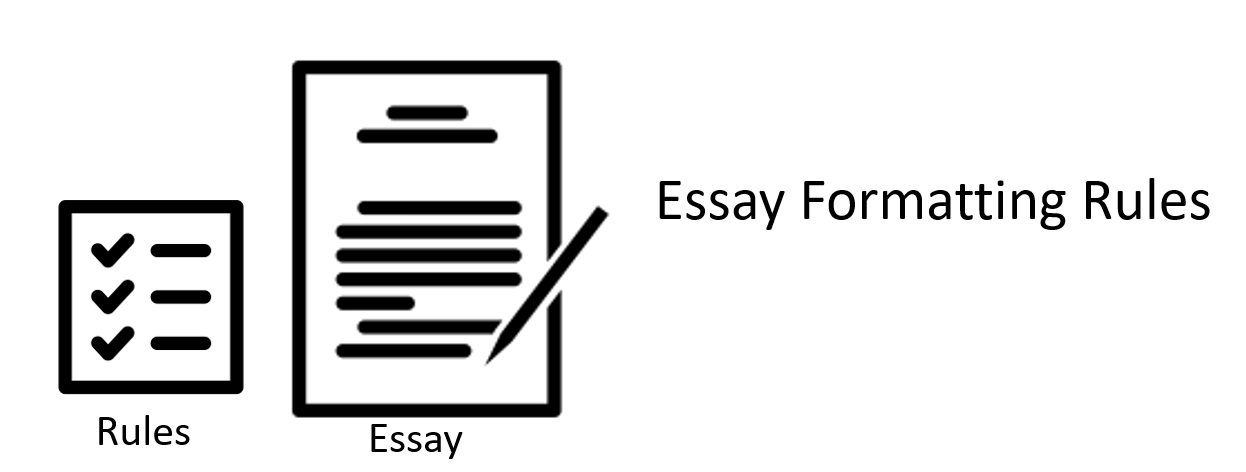
Here are some APA rules for formatting your essays
Title Page
Elements of Title Page | Rules | Example |
|---|---|---|
Title of paper | Title of paper Format: Centred, bold, title case (first letter of major words is capitalized) New line with ENTER key A second new line | Senior Citizens use of Social Media in Waterloo: A Qualitative Study
|
Byline, that is the Author Name | First name Middle initial Period Last name Format: Centred, title case (first letter of major words is capitalized) New line with ENTER key | Justin A. Example |
Author affiliation | Department Coma University name Format: Centred, title case New line with ENTER key | Department of Psychology, Wilfrid Laurier University |
Course number and name | Course number Colon Course name Format: Centred, title case New line with ENTER key | PS398: Qualitative Methods in Psychology |
Instructor Name | Instructor's honorific, such as Dr. Instructor first name Space Instructor last name Format: Centred, title case New line with ENTER key | Dr. Livia Dittmer
|
Assignment Due date | Month Date Comma Year Format: Centred, title case | November 15, 2022 |
Page Number | Numeral 1 Format: use numeral 1 not roman numeral i. Align right. Put in the page header (see below for dealing with page numbers) | 1 |
Text of Paper
Starts on a new page after title page. You will need to use headings to organize your paper into sections.
Headings to Structure Your Paper
Heading Level | Formatting rules | Example |
|---|---|---|
Heading Level 1 | Centred Bold Use Title Case the heading Followed by new indented paragraph in regular text | Introduction: Examining Seniors Use of Social Media INDENT In this paper, the question of the value of qualitative research for studies in social media is examined... |
Heading Level 2 | Flush left (that is aligned left) Bold Title Case Heading Followed by new indented (use tab key) paragraph in regular text | Qualitative Research and Social Media INDENT A benefit of qualitative research is that it examines meaning... |
Heading Level 3 | Flush left Bold Italics Title Case the heading Followed by new indented paragraph in regular text | Seniors Use of Social Media in Canada INDENT More Canadian seniors are turning to social media platforms for... |
Heading Level 4 | Indented (use tab key) Bold Title Case the heading Period Space Text begins on the same line and continues as a regular paragraph | INDENT Differences Amongst Anglophones and Francophones. Anglophone and Francophone communities may use technologies in different ways... |
Heading Level 5 | Indented (use tab key) Bold Italics Title Case the heading Period Space Text begins on the same line and continues as a regular paragraph without bold or italics. | INDENT Studies of Anglophone Seniors. Two major studies were conducted of Anglophone seniors, drawing on populations in Ontario and Western Canada. In the first study... |
Page Numbers
- Flush right
- Put page number in the header of every page
- Use the automatic page-numbering function of your word processor
- Page 1 is the title page
Font
- Use the same font and font size throughout
- Examples: Times New Roman, 12 or Arial, 11.
Line spacing
- double space the entire paper
Margins
- 1 inch or 2.54 margins on all sides (top, bottom, left, and right)
Paragraphs
- Align the text to the left
- Do not use the full justification setting
- Use the tab key to indent the first line of every paragraph 0.5 inches. This should be the default setting for the tab key on word processors
Reference List
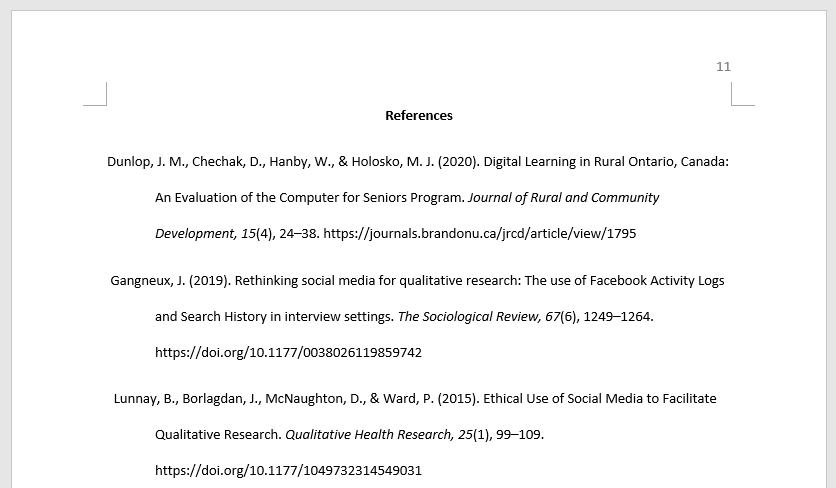
- The reference section starts on a new page after the text
- Use heading level 1 to place and style for the section label: References
- Order the list of references alphabetically by author
- Double space the entire reference list
- Use a hanging indent of 0.5 inches or 1.27 cm for each reference list entry. This means the first line of the reference is aligned left, but the rest of the lines for that reference is 0.5 inches or 1.27 cm from the left.